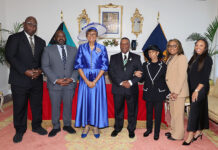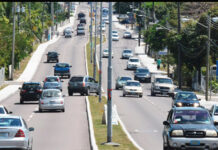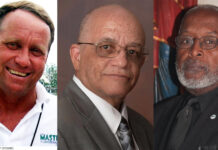Prime Minister Rt. Hon. Hubert Ingraham along with family members and party supporters as he delivers a rallying message on R.M. Bailey Park in 2007.
Nassau, Bahamas – The government’s amendment to the Hotels Encouragement Act will provide incentives to Bahamian businesses in the tourism sector, thereby enabling more Bahamians to obtain “an ownership slice” of the country’s tourism pie, Prime Minister Hubert Ingraham told parliament Wednesday.
LISTEN NOW – Prime Minister Ingraham’s Contribution
The amendment will provide concessions to Bahamians involved in the tourism sector who are not owners or operators of hotels.
Presently, Bahamian businesses located within a hotel or resort property are not permitted to benefit from the concessions enjoyed by the owners and operators of those properties.
This amendment will change that.
The amendment is a continuation of the FNM government’s commitment to expanding the level of Bahamian ownership in the country’s number one industry.
Back in the 1990s, the previous FNM government passed amendments to the Act that resulted in the construction and opening of many small Bahamian resorts.
Mr. Ingraham said he also expects great success to come out of this new amendment.
House Contribution by Prime Minister Ingraham:
THE PRIME MINISTER: The Hotels Encouragement Act was a piece of legislation that was passed by Parliament back in the 1950s and was designed to provide support and exemption from the payment of certain taxes; specifically customs duty and real property tax, to encourage persons to construct hotels to support our primary and principal industry, tourism.
The Act has been very successful in that virtually every hotel in The Bahamas has been constructed under and benefited from the provisions of that Act.
When we were last in office during the 1990s, we determined that we wanted to find a means by which we could encourage more Bahamians to take advantage of the provisions of the Act because the number of hotel rooms that were required for a Bahamian establishment to benefit was high. As a consequence, not many Bahamians took advantage of it.
The success of that policy shift and change is evident by the results on the ground to which I shall refer.
The Government of The Bahamas is very interested and most desirous of increasing and supporting the ownership by Bahamians of a principal segment of our economy; tourism. It is our lot and station to have our principal industry owned almost entirely by non-Bahamians who have provided tremendous opportunities for Bahamians to work, be employed and to provide support services. But in the main the ownership is foreign.
We seek to find a means by which we can support more Bahamians in participating in ownership in that industry. Similarly, we are desirous of doing what we can to make Bahamian businesses as profitable as is possible from a Government point of view, and more successful and today we are concentrating on the touristic industry.
The business of The Bahamas is tourism. I make no apology in saying that we are copying Barbados in this respect. I was most impressed by the result of the Barbados government’s policies during the latter part of the 1990s and during the last five or so years, especially in terms of the number of first class restaurants that they have been able to produce in Barbados and offer to their tourists.
One of the reasons for that has been the incentives and concessions which the government of Barbados provides for hotels and other establishments that engage in the tourism business. Of course Barbados has opened its sector up so that not only Barbadians are able to benefit, but also a number of non-Barbadian nationals.
Since the business of The Bahamas is tourism, it is therefore appropriate that in reviewing Government’s role in support of private sector development and expansion we take steps we deem appropriate to place Bahamian-owned establishments engaged in the business in The Bahamas fully on a level playing field with international investors. In some respects, they are not fully in the same position as international investors in the area to which I shall refer.
Today we are therefore proposing to increase and expand the number of enterprises eligible to access concessions for businesses involved in the supply of goods and services in the tourism industry.
While it is true that all concessions available under the Hotels Encouragement Act are available and accessible to both Bahamian and international persons, it is also on the other hand that these incentives that are available to foreign investors in the country are not necessarily available under the Hotels Encouragement Act in the case of restaurants or in the case of a shop in a hotel, to Bahamians.
There are several hotels that have restaurants that cater substantially to local patrons that were built with concessions under the Hotels Encouragement Act, but a Bahamian wanting to establish an establishment in that same vicinity would not be able to access the same concessions at the owner of that hotel.
And so what has not been done up to now is the provision of access to these concessions by Bahamians who are not owners or operators of hotels. They may be providing the service but they are not owners of the hotel so they cannot get what the hotels get. Even Bahamians who own and operate businesses in resort properties cannot get what the foreigners are able to get.
We continue to “reserve” for Bahamians the retail trade. I say reserve in quotes because we continue to fool ourselves. We tell ourselves that the retail trade is reserved for Bahamians. All Members of Parliament need do is walk along Bay Street beginning at the British Colonial Hotel and stop in any shop, and they’ll see how many shops are in fact Bahamian-owned.
In fact, I was surprised on coming back to office to see the number of foreigners working in shops on Bay Street with permits from the Department of Immigration. They call themselves “gemmologists”, presumably experts at selling gems and jewellery.
This amendment will permit Bahamians to locate, upgrade or maintain their retail or restaurant businesses located in prime tourist areas including downtown Nassau. As part of the incentive to cause Bay Street to be redeveloped, we are going to provide incentives for shops along Bay Street and the downtown area, and along Cable Beach, in the vicinity of the Paradise Island Bridge or elsewhere in New Providence. And of course the same thing will apply in our Family Islands and in areas outside Freeport, Grand Bahama.
In fact, a tourist business will now be able to access concessions notwithstanding that it may be located over-the-hill, in Bain Town, Englerston, Kemp Road or elsewhere.
And this eligibility to access concessions will exist for Bahamians engaged in business in prime tourist areas around our country – in Marsh Harbour, Abaco, Harbour Island, Georgetown, Exuma and elsewhere around our Family Islands.
It is our aim to deepen the penetration of tourism and its expenditure in our economy and to assist even more Bahamians in obtaining slices of the Bahamian tourism pie in addition to the work slice; to get more Bahamians to have an ownership slice of this Bahamian tourism pie.
To be very clear, this amendment to the Hotels Encouragement Act will provide concessions to Bahamians involved in the tourism sector who are not owners or operators of hotels.
The amendment when adopted will enable the Bahamian owners of businesses (shops, restaurants or places of entertainment) located within hotels, within geographical resort areas or in high tourist traffic areas or in other areas designated by the Minister, to access customs duty concessions as are available for hotels under the Hotels Encouragement Act.
There will be four areas under which you can access the benefit:
- a facility located within a hotel
- a facility located with a resort area, for example Paradise Island or Cable Beach
- a facility in a high tourist traffic area
- in other designated areas
We’ve had great success from the amendments which we passed in the 1990s while we were in office and I expect great success to come out of this Amendment.
As presently constructed, the Hotels Encouragement Act permits the owners and or operators of hotels to qualify for customs duty concessions on items imported for the new construction, furnishing and finishings of hotels and resort properties including hotel owned amenities.
Under present practice, hotel operators also benefit from these concessions for the outfit or renovation of any hotel logo shop, restaurant or place of entertainment owned by the hotel owner or operator.
However, independently-owned Bahamian businesses located within a hotel or resort property are not permitted to benefit from these concessions. For example, a Bahamian opening a beauty salon, dress shop, fine china or jewellery store in a hotel is not able to benefit from concessions available under the HEA on their importation of shelving, display cases, mannequins, professional chairs, basins, hair dryers, sound equipment etc. This amendment will change all of that.
It is also to be acknowledged that Bahamian-owned businesses in downtown Nassau, which serves as a shopping mecca for both cruise ship and hotel-based guests are not now eligible for any incentive or concession to assist with construction, start-up, refurbishment or expansion of their business notwithstanding the vital role they play in the make-up of our tourism product.
We have taken the position that that should change.
We believe that this places Bahamian businesses at a disadvantage to hotel-owned and operated concerns and no doubt also serves as a disincentive to Bahamian businesses to locate in resort areas, to regularly upgrade and maintain their business properties or to expand them.
And so the amendment before us will to extend to Bahamian businesses the facilities outlined.
Today, there are some 148 Bahamian owned establishments that have benefited from concessions under the Hotels Encouragement Act following upon the amendments we made in the 1990s.
Here in Nassau there are 27 of them, in Abaco 14, Acklins 6, Andros 20, Bimini 6, Cat Island 14, Crooked Island 3, Eleuthera 24, Exuma 12, Inagua 2, Grand Bahama 4, Long Island 14 and in Ragged Island, 2.
Many small Bahamian resorts have been opened and been constructed as a result of the amendments we passed and I have no doubt that same consequence will come about from this amendment.
This is only a first step along a journey we are going to undertake to provide even more support for Bahamians in this area.
Before the end of the year we shall return to parliament with a Bill that will include all of the incentive legislation into one Act. It will be simple. It will be straightforward and provide for eligibility for customs duty concessions on a wider range of enterprises which cater to the tourism sector including for example leisure and entertainment places, upscale restaurants catering to tourists, cultural facilities, sporting amenities and the like, and nightclubs which may not be located within a hotel but which serve both the resident and visiting public and which contribute to the enhancement of our general ambiance and hence to the benefit of our tourism product.
And, in the case of down-town Nassau principally, we have under consideration the exemption from not only customs duty but also exemption from Real Property Tax and Business Licence Fees and the Stamp Act for a for businesses that significantly upgrade, refurbish and or expand in our principal city which is dirty, run-down, shabby, smelly; especially East of East Street and we intend to restore it.
Finally, my Government will introduce a Bill to provide for customs duty concessions on materials required for the construction and upgrade of designated airports. Specifically, the Lynden Pindling International Airport and Marsh Harbour International Airport will be immediate beneficiaries but so will Treasure Cay, North Eleuthera and Moss Town, Exuma.
The law will also provide for the opportunity for the Minister, by order, to extend the list if and when necessary.
If we can find the means to be successful in helping Bahamians in the construction of their facilities in the Family Islands so that they are not building enclosed places that require air conditioning at all times, if we can find the means by which tourism can assist them in promoting and marketing their place, and if we can get Bahamians in the Family Islands to charge realistic dollar numbers, we can create a market not only for foreign but Bahamian tourism.
With gratitude to the Bahamian people for the opportunity to serve them once again in this high Office, I now move the adoption of the Amendment to the Hotels Encouragement Act before us.








